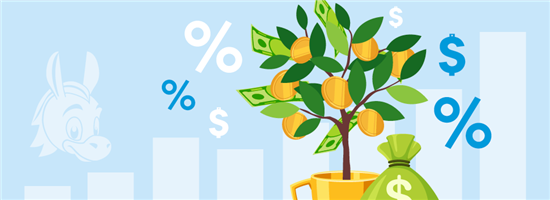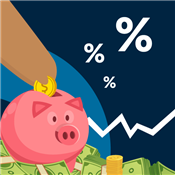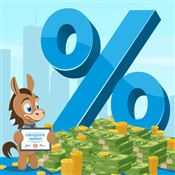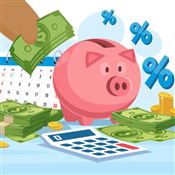Best Compound Interest Accounts
Ad Disclosure: This article contains references to products from our partners. We may receive compensation if you apply or shop through links in our content. This compensation may impact how and where products appear on this site. You help support CreditDonkey by using our links.
Are you looking for a way to grow your wealth? Check out these compound interest accounts to help you get started.
 |
Compound interest accounts can be a great way to increase your funds passively. Over time, it makes your money work for you to build a solid financial future.
Ready to start? Check out the best compound interest accounts to help you in your financial journey.
11 Best Compound Interest Accounts
Here are some of the best compound interest accounts and investments you can consider if you want to grow your wealth.
High-Yield Savings Account
A high-yield savings account (HYSA) is like a regular savings account except it pays much higher interest. It is often offered by online banks, so you might have limited access to physical locations or ATMs.
But in exchange, most high-yield accounts have low or no fees, allowing you to maximize your earnings. You can park your emergency funds in an HYSA because it's very liquid but still earns good interest.
- Good for: Risk-averse individuals
- Risk level: Low
- Potential returns: Moderate
Pros + Cons
|
|
- Axos ONE:
Earn up to 4.31% APY - Valley National Bank:
High-Yield Savings Account - 4.03% APY - Live Oak Bank:
Personal Savings - Earn 3.90% APY - Western Alliance Bank:
High Yield Savings Account - 3.90% APY - Mission Valley Bank:
High Yield Savings Account - 3.86% APY
Money Market Account
A money market account is like a mix of a savings account and a checking account. It often offers solid interest rates and easy access to your money.
However, some banks may require you to make a higher initial deposit or to maintain a certain balance. And just like high-yield accounts, the rates may change over time.
- Good for: Risk-averse individuals
- Risk level: Low
- Potential returns: Moderate
Pros + Cons
|
|
- UFB Portfolio Money Market:
Earn up to 3.40% APY
Certificate of Deposit (CD)
A Certificate of Deposit or CD rates is a type of deposit account with fixed interest rates. In exchange, your money must remain locked up with a bank for a set period.
If you need to access it early, you will most likely have to pay penalties which can reduce your interest earnings.
- Good for: Risk-averse individuals
- Risk level: Very low
- Potential returns: Moderate
Pros + Cons
|
|
- Raisin:
High-Yield CD - Up to $2,000 Bonus - Sallie Mae Bank CD Rates:
Up to 4.00% APY - Mission Valley Bank CD Rates:
Up to 3.80% APY - Quontic:
CD Rates - Up to 3.75% APY - Western Alliance Bank:
High-Yield CD Rates - Up to 3.60% APY
Bonds
Bonds are a type of investment where you lend your money to companies or government entities. In return, they pay you a fixed interest on a regular basis.
It is typically considered low to medium risk. However, some bonds (namely corporate bonds) don't have guaranteed payments if the company fails.
You can purchase bonds through brokers like Fidelity or Interactive Brokers (IBKR).
- Good for: Stable source of income
- Risk level: Moderate
- Potential returns: Moderate
Pros + Cons
|
|
Dividend Stocks
A dividend stock pays out dividends that make for good passive income. By investing in a dividend-paying company, you get a cut of their profits based on the shares you own.
You will need to reinvest the dividends you receive to earn compound interest. Just keep in mind that stock trading is relatively risky, especially if your portfolio isn't diversified.
- Good for: Passive income from dividends
- Risk level: High
- Potential returns: High
Pros + Cons
|
|
Exchange-Traded Funds (ETFs)
Exchange-Traded Funds (ETFs) are a bunch of different investments pooled together in one package. They work similarly to stocks, so you can buy and sell them on stock trading apps.
It is a convenient choice for individuals looking to invest in a variety of assets all at once and for beginners interested in exploring the stock market.
Almost all ETFs pay dividends, but some pay more than others. If you want higher payouts, consider investing in high-dividend ETFs.
- Good for: Passive and diversified investments in stocks and bonds
- Risk level: Moderate
- Potential returns: High
Pros + Cons
|
|
Mutual Funds
Mutual funds work similarly to ETFs in that they invest in a pool of assets like bonds and stocks. However, unlike ETFs, mutual funds are not traded on the stock exchange. Instead, you'll need to buy them directly from the fund company or through mutual fund marketplaces like Fidelity or Interactive Brokers (IBKR).
These are usually managed by professional fund managers, so you can rest assured that your investments will be taken care of by experts. Just like stocks and ETFs, you need to reinvest your dividends to benefit from compound interest.
- Good for: Passive and diversified investments
- Risk level: Moderate
- Potential returns: High
Pros + Cons
|
|
Real Estate
To earn compounding interest through real estate, invest in rental units for regular income. Luckily, you don't need to buy an actual property to start earning from real estate.
Real estate crowdfunding platforms like Arrived let you invest in rental units for just $100. Basically, you're co-investing in a property with others and receiving dividends based on your share.
- Good for: Stable income stream from rent
- Risk level: High
- Potential returns: Very high
Pros + Cons
|
|
Invest in Rental Homes with $100+
Browse rental home investments for free. No bank account required
Real Estate Investment Trusts (REITs)
Real Estate Investment Trusts (REITs) are companies that own or manage income-producing properties. When you buy shares of a REIT, it rents out properties, and you receive dividends from the profit it earns.
REITs can be publicly or privately traded. Public REITs can be easily bought through stock trading apps. Private REITs, on the other hand, are usually available through alternative investment platforms like Fundrise for just $10.
- Good for: Regular income stream from real estate without big capital
- Risk level: Very high
- Potential returns: Very high
Pros + Cons
|
|
Invest in Real Estate with $10+
- Only $10 minimum investment
- Get a diversified portfolio of real estate projects across the US
- Open to all investors
Alternative Investments
Alternative investments refer to anything outside of traditional investments like stocks, bonds, and cash deposits.
This includes fine art, fine wine, and other collectibles. Some of these assets do not generate income. So, invest in alternative assets like private credit, farmland, or private REITs to earn dividends or cash yields.
However, this type of investment is seen as riskier and more costly than traditional assets.
- Good for: Non-traditional investors
- Risk level: Very high
- Potential returns: Moderate
Pros + Cons
|
|
Cryptocurrencies
Cryptocurrencies are basically virtual money that operate on blockchain technology. Unlike traditional currencies, crypto coins are not regulated.
Trading crypto may potentially yield high rewards, but it's also highly risky. Even the most popular coins, like Bitcoin (BTC), have a history of losing over 50% of their value.[1]
To earn cash yields in crypto, consider staking, providing liquidity
, or crypto lending
.
- Good for: Tech savvy, digital investors
- Risk level: Very high
- Potential returns: Very high
Pros + Cons
|
|
Buy and Sell Cryptocurrency
Robinhood Crypto offers commission-free cryptocurrency investments 24/7. Some of the cryptocurrencies available are Bitcoin, Dogecoin, Ethereum, and Litecoin. This offer is currently available to selected states.
How Does Compound Interest Work?
Compound interest is best described as the "interest earned on interest". The way it works is the interest you earned will be reinvested, allowing it to earn even more over time.
The easiest way to understand it is through the snowball effect. As a snowball rolls down a hill, it grows bigger and bigger. Same with compound interest. As time passes, your earnings increase more as more interest is added to the balance.
Let's use an example: You invest $1,000 with a 5% interest that compounds daily. In the first year, you earn $50 in interest, so you now have $1,050.
In the second year, you earn 5% on $1,050 which is around $52.50. Each year, you essentially earn interest on a larger amount, so your money grows faster and faster, like a snowball rolling downhill.
The rule of 72 helps you estimate how long it takes for your money to double. Just divide 72 by your interest rate. For example, if you earn 5% interest, your money will double in about 14.4 years (since 72 divided by 5 equals 14.4). However, note that this rule is simply a rough estimate and not exact.
How Much Can You Earn?
How to Choose the Best Compound Interest Account
To get the most from your money, you need to consider the following factors before picking a compound interest account:
- Interest Rate:
You want to put your money where it earns the most interest. So, do research and compare to find the highest rates available. - Risk Level:
Choose an account or investment with a risk level you're okay with. This helps you know what you might gain or lose with your account. - Fees:
Since fees can eat into your earnings, it would be best to open a compound interest account with minimal or no fees. - Financial Goals:
Establishing your financial goals and timeline allows you to compare different accounts based on what you need, making sure they fit your plan.
What Are the Risks of Compound Interest?
Even though the idea of growing your money over time sounds great, it does come with its fair share of risks. Here are some to look out for:
- Interest Rate Changes:
This can be a disadvantage depending on your investment. For example, fixed-rate investments may not be as profitable if rates increase. - Market Condition:
The market can change and fluctuate unexpectedly. This can lead to either gains or losses depending on your investment. - Fees and Penalties:
Fees and penalties can still reduce your earnings even with low-risk deposit accounts. - Unpredictable Returns:
Some of the riskier investments out there have unpredictable or irregular payouts, which may not be ideal for those who prefer consistent streams of income.
If you have enough capital and can create a diverse investment portfolio, then you can definitely keep yourself afloat with compound interest. The key is to find a balance between risk and reward when you're investing.
How to Open a Compound Interest Account
Opening a savings account, money market account, or CD is easy, especially with a bank or credit union. Here's how the online process usually works:
- Select your chosen compound interest account.
Banks and credit unions typically offer savings accounts, money market accounts, and/or CDs. Make sure to browse through your options first before choosing. - Fill-out the application form.
Answer the account application form which is usually found on the bank or credit union's website. You would also need to provide your personal information (like your name, birth date, address, SSN, etc) and a government ID. - Submit and fund your account.
Finally, submit your application and fund your account. If there's no minimum deposit requirement, you can add money as you please, but be mindful of specific grace periods.
If you want to invest, you can open a brokerage account to buy stocks, bonds, etc. The process is similar to opening a bank account, requiring similar documents and information.
Which Account Has the Best Compound Interest?
Each investment has its advantages and disadvantages. The best option will depend on your financial goals, your risk tolerance, and how long you can invest your money.
Just remember that some investments may have high earning potential but can come with equally high risks. Low-risk investments pegged to interest rates can also change over time.
Proper research and identifying your needs and preferences beforehand can help you find which account is best suited for you.
How To Maximize Your Compound Interest Account
Opening a compound interest account is just the first step. To get the most out of it, follow these tips:
- Reinvest your earnings to grow your account faster
- Make regular contributions to boost your chances of steady long-term returns
- Spread out your investments to lower risk and potentially earn more
- Keep track of your investments to see if they still match your goals and make changes if needed
Can You Lose Money in a Compound Interest Account?
Generally, you won't lose funds in a compound interest account like high-yield savings and CDs. For one, they are typically federally insured so your deposits are covered. However, your balance can still go down due to fees, service charges, or early withdrawal penalties.
But if you have riskier investments like stocks and real estate, its value can fluctuate which can result in losses. So, before you commit to an account or an investment, make sure to be aware of the risks by doing research and understanding what you're getting into.
No, it is not. Most of the earnings you get from compound interest on investments are taxable.[2] However, each state has different regulations and laws on these accounts/investments.
Should You Get a Compound Interest Account?
If you want to increase your funds even more, investing in a compound interest account is a good idea. Fortunately, there are various options, both passive and active, to choose from.
You should make sure that your chosen investment aligns with your financial objectives. This is because some accounts are better for short-term investments while others are great for long-term goals.
Think about factors like the risk, potential returns, and accessibility to help you decide.
Bottom Line
There are many types of accounts and assets where the concept of compound interest is applicable. This gives you many options to choose from so you can build a diversified investment portfolio.
If you want to take advantage of compound interest to grow your funds, take time to assess your financial situation and preferences before you lock in on an investment.
References
- ^ Bloomberg. Bitcoin Has Lost Half Its Value Since Hitting Record High, Retrieved 03/30/2025
- ^ IRS. Publication 550 (2022), Investment Income and Expenses, Retrieved 04/19/2025
Write to Darlene Santos at feedback@creditdonkey.com. Follow us on Twitter and Facebook for our latest posts.
Note: This website is made possible through financial relationships with some of the products and services mentioned on this site. We may receive compensation if you shop through links in our content. You do not have to use our links, but you help support CreditDonkey if you do.
Fundrise, LLC ("Fundrise") compensates CreditDonkey Inc for new leads. CreditDonkey Inc is not an investment client of Fundrise.
|
|
| ||||||
|
|
|









